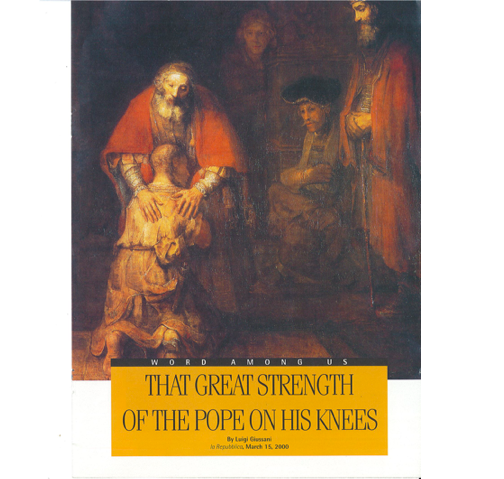
That Great Strength of the Pope on His Knees
By Luigi Giussani la Repubblica, March 15, 2000.Dear Editor,
The attention that your newspaper has given to the Pope's gesture at the beginning of Lent and the numerous interventions published in la Repubblica-beginning with the editorial by Eugenio Scalfari-in these days, has moved me to request your hospitality for a personal contribution of mine. To see the Pope, beaten like Christ the prophet and humiliated for the whole Church, asking pardon for the faults committed by Christians, moves me profoundly, as it has moved many in these times.
This request for forgiveness seems to me the most resplendent and the greatest witness of the novelty of Christianity, thus marking the irremediable difference between the Christian and the non-Christian. It is difficult for us to understand the importance of this papal gesture, that could easily be reduced in the schemes of historical revisionism. What moves the Pope is not merely a political or a propagandistic aim; I believe rather that John Paul II, provoked by a favorable circumstance-the celebration of the two thousandth anniversary of the Incarnation-wants to demonstrate the truth of Christ and of the Church. This truth is carried by men of flesh and blood, because this is the method that God chose in order to make Himself known in history. For the Mystery, otherwise unknown, communicates itself by means of a human factor: God came into the world as a child in the womb of a young Jewish girl, born in the flesh exactly like each one of us.
So no disproportion, no inadequacy, no error on the part of man can be an objection to Christianity. The existential limitation-the Bible calls it "sin"-that man experiences is not an objection to the handing-on and the translating of Christianity in history, because no wretchedness could eliminate the paradoxical nature of the instrument, the human factor, chosen by God in order to make Himself known.
The Church is a human reality in which can be found unworthy people, rude people of little worth, sometimes violent, fragile, and presumptuous men, inadequate parents and rebellious children. But the Church does not stay on the other side, that is to say that of the Pharisees and of those without sin. Thus the Christian knows he is a sinner, and precisely the awareness of being a sinner is the first and most honest step that can be taken as regards oneself and others, if one doesn't wish to become presumptuously intolerant and violent.
This is why the request for forgiveness from men and from God is the purest act for the man who believes in Him and who cries out to God, as all the Psalms of Israel make evident to us every day.
It is therefore in order to affirm a positivity, the positivity of Christ, present in history and victorious, that man asks forgiveness. And it is in order that this positivity be for the whole world that the Pope goes down on his knees, taking upon himself the faults of each one. Precisely, not judging them in the name of an abstract morality or laws imposed by men, but renewing the dynamics of conversion and forgiveness, which is not a yielding, but rather a strength that recreates man before the great Presence. Here is the difference.
The Christian is attached to no one but Jesus. All the ideologies have an aspect for which man is sure of at least one thing that he himself does, and it is that which he will never want to give up nor allow to be challenged. But the Christian knows that his efforts and all he possesses or does must always yield before the truth. So he is the only true fighter for the purification of the world and for justice. Because justice is relationship with God, justice is God's plan; so whoever has met Christ does not wait an instant before helping the world to be better, or at least more bearable. He is also deeply convinced, though, that the world will always persecute him and accuse him of all kinds of evil.
The Pope on his knees does not suggest to me an image of weakness. It reminds me rather of Spartacus of old, who rises up with all the stature of his humanity in a supreme gesture of freedom, as an example offered for the always-desired happiness of each and everyone. This Pope renews in me and in my friends the courage necessary in order to support the hope of men.
(This article was also published in the National Catholic Register, April 2-8, 2000)